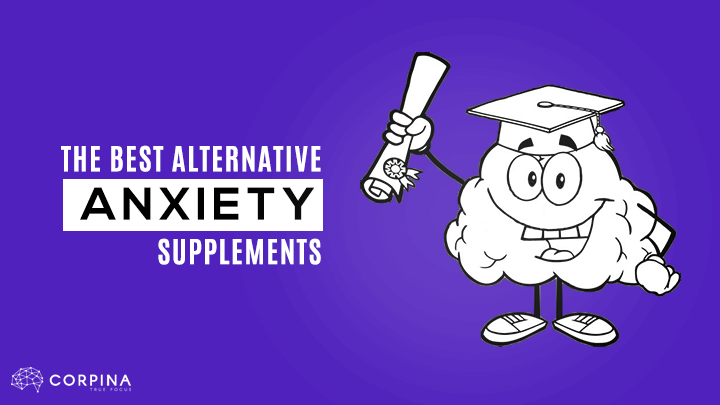16 Essential Anxiety Supplements That Are Worth Trying
In my work as a Special Education Advocate and Family Support Group facilitator, I know that herbal remedies for anxiety are often under-utilized as treatments, compared with stimulants, antidepressants, and other psychotropic medications.
Herbal remedies attract consumers because they are affordable and you won’t have to pay for a doctor visit. Because of their botanical origins, many of them have the added advantage of arousing our sense of smell with their fragrant scents.
Herbal remedies are less likely to have severe side effects than their medical counterparts, which makes them viable alternatives for children and adults with sensitivities.
Here are the best anti-anxiety herbs to try:
1. Chamomile – a Natural Sedative
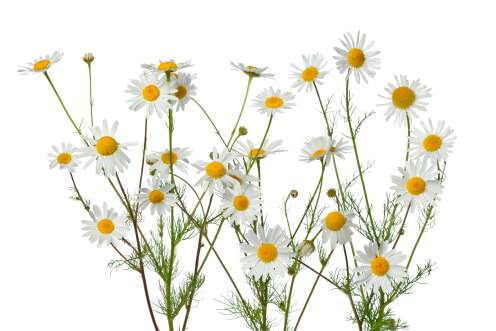
Many people consume chamomile as a tea. Chamomile is also available as a pill and acts in the brain in the same way as anxiety medications like Valium.
In their initial tests, researchers determined Chamomile has noticeable anxiolytic abilities.
Through further study, researchers have concluded that it provides “meaningful antidepressant activity that occurs in addition to its previously observed anxiolytic activity.”
To date, there are no known serious adverse effects from regular doses of Chamomile. It can cause allergic reactions in some individuals. It may also interact (in a manner similar to estrogen) in persons with certain hormone conditions.
The National Center for Biotechnology Information states that there is no evidence that chamomile directly cures a condition, though it is generally accepted around the world as something that soothes tension, alleviates headache symptoms, and calms the digestive system.
Chamomile is safe for most adults and children to take. Many people also believe that chamomile is one of the best anti-anxiety herbs for dogs.
Dr. Mercola suggests drinking chamomile in tea. Migraine sufferers may prefer to grind it into a paste and apply it to the forehead and sides of the head for about 30 minutes.
HOW TO USE
You can try to take Chamomile over a period of 8-weeks, at a daily dose of 220-1110mg to reduce the effects of generalized anxiety disorders. Chamomile can be taken periodically or on an as-needed basis.
2. Ashwagandha – Fights Depression and Fatigue
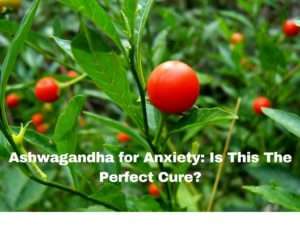
Ashwagandha is an ancient herbal remedy that has been used effectively in the past and present to reduce symptoms of depression, fatigue, and a general lack of motivation. Ashwagandha has long been a component of traditional Indian medicine. In the past, practitioners of Ayurveda have used it to control stress, relieve insomnia, and ease depression symptoms.
Researchers do not yet fully understand its primary mechanism. They believe that the plant is an adaptogen compound. It can help control Cortisol levels, which reduces stress. Several studies have exhibited the plant’s positive effects.
In studies, Ashwagandha has been shown to increase serotonin in the brain and has a significant impact on the stress hormone, cortisol, as reported by NCBI. It’s far from a cure-all, but taking Ashwagandha can reduce stress by 25%.
The biggest negative factor in taking Ashwagandha is the smell. The name means “smell of horse.” Many users believe that Ashwagandha is as strong as a horse, so they overlook the foul odor.
Ashwagandha is safe to take, with very limited side-effects. Most problems come from taking too much of the supplement or mixing it with other compounds that have a synergistic effect.
HOW TO USE
You could take anxiety relief supplements containing Ashwagandha three times a day, in doses of 2,000mg. You can take lower doses to achieve some of the plant’s other benefits. Make sure to take your doses with meals.
3. Passionflower – Treats Anxiety and Insomnia
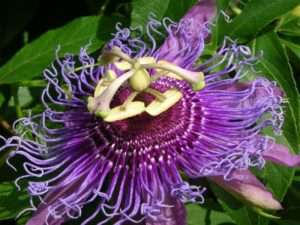
Passionflower is native to North America and has long been used by Native Americans to treat anxiety and insomnia. It had such a strong reputation as an anxiety reliever that Europeans took it back overseas, and it is now widely grown there for medicinal purposes, as well.
According to the University of Maryland Medical Center, passionflower works by increasing the levels of gamma-amniobutyric acid (GABA), which is a major relaxing neurotransmitter. Passionflower has milder effects than kava and valerian, although users claim that passionflower has fewer side effects.
The effects of passion flower are similar to benzodiazepines, which increase the amounts of GABA (gamma-aminobutyric acid), a neurotransmitter that reduces stress and anxiety.
Passion flower can also address insomnia and anger with its calming effect produced in the brain. While passion flower is not likely to be strong enough for severe anxiety, it can easily help with daily, mild levels of anxiety.
Passion flower has occasionally caused drowsiness, but is safer than oxazepam, one of the leading antidepressants given for anxiety.
Passionflower is a mild anti-anxiety herb but has not been proven safe for children, pregnant women, or nursing mothers. Physicians advise that people taking blood thinners or Monoamine oxidase inhibitors (MAOI’s) should also avoid taking passionflower.
HOW TO USE
1/2 tsp (1040 mg) of this PassionFlower Extract should give you relief within an hour.
4. Lemon Balm – Safe for Kids, Pregnant Women, and Nursing Mothers
Lemon balm, also known as Melissa officinalis, has been used for centuries to treat anxiety and stress naturally. It helps with pain like headaches and digestion, which can also be symptoms of anxiety.
Several studies have proven the effectiveness of lemon balm for children, pregnant women, and nursing mothers, as reported by the naturopathic expert, Mary Bove.
In a study where participants were given either 600 mg of lemon balm extracts or a placebo, those who took lemon balm had more positive moods and were calmer.
Like some of the other herbal remedies, lemon balm reduces the stress hormone, cortisol and increases the GABA neurotransmitter to alleviate symptoms of anxiety.
Lemon balm is a member of the mint family, so most children and others enjoy the pleasant mint taste with notes of lemon. Lemon balm works well with other herbs like valerian, hops, and chamomile.
Lemon balm has been used since the Middle Ages as a calming herbal remedy. If your pet has issues with anxiety, it’s also safe for animals.
HOW TO USE
Lemon balm can be taken as a tea, capsule, or extract. Often it is combined with chamomile or valerian. As a dietary supplement, you could mix 15-30 drops in water and take 1-3 times daily.
5. Lavender – Reduces Stress

“The Handbook of Essential Oils: Science, Technology, and Applications,” points to clinical trials that showed that inhaling lavender essential oil reduced stress and anxiety.
Students in Florida participated in a study that revealed that those who inhaled the scent of lavender oil before exams were less anxious.
One study in a Greek dental office found that patients were less anxious when they used lavender oil to scent the waiting room.
Dr. Josh Axe notes that lavender is considered a nervous system restorative that helps improve sleep, restlessness, irritability, panic, attacks, nervous stomach, and nervous tension. Dr. Axe calls attention to other studies that proved that lavender oil decreases anxiety, especially for patients that were about to undergo surgery or dental procedures.
Besides having a fresh, floral fragrance that appeals to most people, lavender works well for anxiety without many of the risks and side effects of anti-anxiety medications.
HOW TO USE
To benefit from lavender oil (get it from Amazon), you can:
- inhale the scent (rub a few drops on your palms and take a deep breath or add 6 – 8 drops to a room diffuser, rub 1-2 drops on your temples, or mix 10 – 15 drops with water and spray on your body, hair, pillow or pajamas)
- drink lavender herbal tea
- take a lavender bath (add 15-20 drops to your bath water)
6. Kava – Well-Researched Ancient Herb
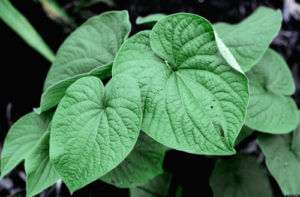
Kava, also known as Kava Kava, has a long history of use in the South Pacific. It is one of the most researched herbal supplements for anxiety.
Kava root is available as a tea or extract. The US Food and Drug Administration (FDA) has approved its use for anxiety.
Researchers believe that the lactones within the Kava extract produce the anti-anxiety effect. After oral ingestion, the effects are noticeable within an hour.
Those who take Kava report feeling cheerful and having a marked decrease in general anxiety. Users also report a reduction in feelings of depression.
Studies back this up, showing the supplement has a clear effect on anxiety in test participants. Researchers have also concluded it is a suitable replacement for those taking Benzodiazepines.
Once Kava was believed to have links to liver damage, but these results have been overturned. Studies that claimed this link existed used participants predisposed to liver damage, skewing the data.
Both the FDA and NIH have implicated Kava for causing liver damage. Research suggests that liver damage is only a concern when individuals take large doses outside of the recommended range. As with all natural anxiety supplements, following dosage instructions is key.
Most experts agree that kava is one of the most potent natural remedies for insomnia, anxiety symptoms and for controlling anxious thoughts. Kava is reported to be as effective as some prescription anti-anxiety drugs.
Kava is not advisable for everyone, especially for people that drink alcohol, take other medications, or have liver problems. These concerns caused some countries to ban the use of kava. The ban in the United States was lifted in 2008. According to the Children’s Hospital of Michigan, kava can be used with children but is not recommended.
Not enough studies have been performed to prove kava as an anti-anxiety herb that is safe for pregnancy, so pregnant and nursing mothers should avoid taking it to be on the safe side.
HOW TO USE
You could start with the WS1490 extract. The optimal treatment for anxiety is three 100mg doses taken throughout the day. Some users can handle higher levels for a short while, but there are risks.
7. Arctic Root – Combats Fatigue and Anxiety
Arctic root is also called golden root, rose root, western roseroot, Aaron’s rod, king’s crown, Rhodiola Rosea, and many other names. It is a popular herb in Chinese medicine, which may be attributed to the fact that it mainly grows in cold regions like the mountains of central China and the Arctic region. Scandinavian countries also use it as a traditional medicine.
Arctic root has been proven successful for anxiety that is accompanied by fatigue. It can also be used to treat depression, seasonal affective disorder (SAD), fibromyalgia, chronic fatigue syndrome (CFS), and memory loss.
HOW TO USE
To use Rhodiola as a daily preventative tool against fatigue and anxiety 50mg dose has been reported to be effective.
8. Bacopa – Improves Memory Loss and Decreases Anxiety
Bacopa Monnieri is also known as Bacopa. It may also be referred to as Brahmi, which comes from the word, Brahman, which means “the energy of universal consciousness.”
WebMD notes that Ayurvedic medicine was introduced in India thousands of years ago as a holistic approach to medicine. Bacopa is a highly esteemed herb in Ayurvedic medicine that works to balance the body, mind, and spirit. Ayurvedic medicines work to promote good health rather than fight diseases and disorders.
Bacopa enjoys a strong reputation for reducing anxiety that is accompanied by memory loss and attention problems. It’s a slow-acting herb that stays in your system and can take 2-3 months for peak performance.
HOW TO USE
If you are looking for an herbal remedy that includes bacopa and other herbs, Alpha Brain and Optimind are good products to try.
9. Gingko Biloba – Anti-Anxiety Herb and Cognitive Function Enhancer
Extracts from the Ginkgo leaf are a well-known memory and cognitive function enhancer. They also help treat symptoms of anxiety.
In studies, researchers have shown that Ginkgo is significantly superior to a placebo in reducing anxiety. It may also benefit elderly individuals suffering from anxiety-related cognitive decline.
You should strictly adhere to the correct dosage of Ginkgo, as there are several side effects related to overuse. Ginkgo can cause nausea, diarrhea, dizziness, and headaches. It can also interfere with the proper functioning of anti-depressants.
Individuals taking SSRIs should refrain from taking Ginkgo unless they have first consulted their doctor. Individuals taking anticoagulants might also experience adverse effects if taken with Ginkgo.
One of Gingko Biloba’s claims to fame is that a few ginkgo trees actually survived near the site of the bombing of Hiroshima and are still alive today. Archaeologists claim to have found ginkgo fossils that date back to prehistoric times.
The Chinese have long used Ginkgo biloba leaves and seeds in medicines to reduce stress and anxiety, alleviate depression, and reduce ADHD symptoms with fewer side effects than Ritalin.
Because of its many uses, Ginkgo biloba is one of the most popular herbal remedies in the world.
HOW TO USE
When supplementing, you should take 240-480mg of Ginkgo per day. It is best to divide the supplement into three doses to take with meals.
Some individuals may not begin to see results for 4 to 6-weeks, but with continued use, they will notice a significant effect.
10. Panax Ginseng – Keeps You Alert While Keeping You Calm
The Chinese people have used panax ginseng for over 5,000 years as “the elixir of life.” Ginseng plants can be found in China, Korea, other parts of Asia, and America. It might surprise you to learn that Chinese people consider American ginseng to be the best in the world.
Dr. Michael Murray notes that ginseng relaxes you while giving you a boost of energy, without being over stimulating. In addition to helping relieve anxiety, ginseng also effectively treats depression, fatigue, stress-related disorders, and lots of other mental and physical conditions.
HOW TO USE
You could take Panax Ginseng in doses of 100 to 400mg daily.
11. Valerian Root – Strong Anxiety Reliever and Natural Sedative
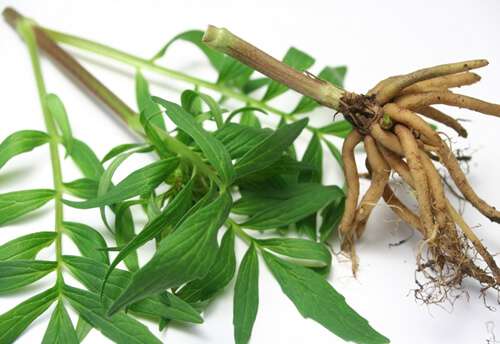
Also known by its proper name: Valerian Officinalis. This root is well known as an ingredient in many sleep-inducing teas. Scientific evidence supporting its ability to induce sleep, however, is scant.
What researchers do know is that the root extract can interact with chemical receptors in the body. This interaction produces a sedative effect which, in turn, may help some users control anxiety.
Valerian is commonly used in anxiety supplements for dogs. Human trials however, have not yet produced the same results.
Proponents firmly believe, though, that the root’s chemical properties have anxiolytic benefits. There is anecdotal evidence from enthusiastic supporters who swear by its effectiveness as well.
The root is safe for consumption. Side-effects may include intense dreaming, diarrhea, or a hangover-like sensation post-use.
Everyday Health affirms that valerian is best known as a sleep aid. It’s a such a strong sedative that it’s known as “nature’s Valium.” Experts believe that valerian works by increasing GABA levels in the brain.
Valerian root has relaxing qualities that also soothe muscles, relieve uterine cramps, quiets persistent coughs, and relaxes bronchial spasms.
Due to its strength, valerian is an anti-anxiety herb that isn’t recommended for children, pregnant or nursing women, or anyone that takes antidepressants or anti-anxiety drugs.
HOW TO USE
The root is commonly mixed in teas but does not have a pleasant smell. You can take it in tablet and capsule form as well.
Those who choose to take Valerian as a sleep aid can take a standard dose of 450mg before bed. As a daytime anxiety supplement, you should take 2-3 doses of 300mg with meals.
12. Green and Black Teas – Antioxidants to Reduce Anxiety Symptoms
The University of Maryland Medical Center affirms that green and black teas are considered the healthiest liquids on the planet because they are full of antioxidants.
In addition to reducing anxiety symptoms, green and black teas are effective for diseases such as high cholesterol, inflammatory bowel disease, diabetes, liver disease, weight loss, and other medical concerns.
The National Cancer Institute affirms that teas may be helpful aids in treating many forms of cancer. CBS News reported that pregnant and nursing women that take herbs pass the effects down to the baby, which can pose risks to their infants. Physicians recommend that pregnant and nursing mothers weigh the risks in taking herbs with the benefits they provide.
13. Magnesium
Magnesium is a mineral that is a normal part of most healthy diets. It plays a significant role in reducing the risk of anxiety, social anxiety, and panic attacks.
A deficiency in magnesium can result in reduced energy levels and induce some forms of neuropathology. To counteract this, supplementing Magnesium into the diet is key.
One hypothesis, Rapid Recovery From Major Depression Using Magnesium Treatment, posited that the removal of Magnesium from bread, water, and other sources of nutrition contributed to greater instances of magnesium deficiency.
They concluded that daily supplementation with Magnesium, at morning and bedtime, could counteract the effects of some forms of depression.
Other studies show synergistic effects between Magnesium and other compounds.
HOW TO USE
Magnesium is available in pill, liquid, and even flakes and sprays.
The standard dose of Magnesium is 200-400mg. You should take doses with food, in one of the many readily available forms. Magnesium comes as tablets, caplets, powders, capsules, and liquids.
It is generally safe, and the kidneys can deal with over consumption of Magnesium from food. In supplement form, though, too much Magnesium can induce diarrhea.
Epsom salts also contain magnesium, so you might consider dissolving these into a bath.
Children with anxiety can benefit from this. Pumpkin, sunflower, sesame, and flax seeds can be incorporated as a healthy snack for kids.
14. Melatonin
Melatonin is a hormone involved in regulating the body’s sleep cycle. A Melatonin deficiency can lead to poor sleep, and an increase in anxiety. As a supplement, Melatonin can help counteract anxiety related insomnia.
It allows users to fall asleep regularly and can induce a state of calm around bedtime. It can also help improve sleep quality for some individuals.
Melatonin can also help with anxiety and pain associated with surgery.
HOW TO USE
A standard dose of Melatonin of about 3-5mg is effective for dealing with anxiety-related sleep issues. You should take Melatonin rough 30 minutes before bed for maximum effect.
It is not addictive, and non-tolerance forming. Studies have shown no toxicity with standard doses.
15. 5-HTP – Mood Enhancing Supplement
This compound is essential to the production of serotonin, which increases happiness levels. 5-HTP has an effect similar to some SSRIs like Prozac and Zoloft. The euphoria experienced when taking 5-HTP helps some users deal with effects of anxiety and depression.
Some studies exist to support the effect of 5-HTP on the mood. A group of participants exhibited a moderate reduction in anxiety symptoms during the trial.
Following these guidelines is important, as 5-HTP can be toxic at high doses. It can also cause minor side effects like nausea, heartburn, and gas.
Because of its potential to interact with SSRIs, those taking them should not take 5-HTP. Those on anti-depressants should consult their physician before trying 5-HTP.
5-HTP also has interactions with some Parkinson’s medications, cough syrups, and migraine medications.
HOW TO USE
5-HTP isn’t available from dietary sources, so supplements are made from the seeds of an African tree, the Griffonia Simplicifolia. Those taking 5-HTP for anxiety should do so in daily doses of 150-300mg.
16. Nuphorin
What happens when you mix several substances with possible anti-anxiety effects into one? You get Nuphorin. This capsule is a blend of Vitamin B, Calcium, Ashwagandha, GABA, Chamomile, 5-HTP, and DMAE.
Proponents say the mix of compounds helps raise the levels of neurotransmitters in the body responsible for happiness. There is scientific evidence to support the notion that these compounds have a positive effect on mood.
Nuphorin anxiety relief reviews show that it has extremely positive effects, for some. Individuals that benefit from Nuphorin report an overall feeling of calm, a cessation of panic attacks, and improved sleep quality.
No substance works 100% for everyone, but the net positive Nuphorin anxiety reviews suggest that it’s worth a try, if for nothing else than to see if it benefits you.
Conclusion
There are a lot of anxiety relief supplements. I understand what it’s like to have an overwhelming amount of information to sift through.
That’s why I like to help other anxiety sufferers by providing some upfront info to narrow down their choices. Hopefully, this list got you on the right track, and you’ll be able to find a supplement that works well for you.
Got any other suggestions? Make sure to let me know in the comments.

